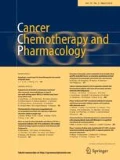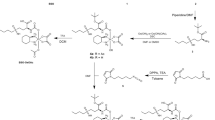Abstract
Novel glutathione (GSH) analogs, previously shown to inhibit glutathione S-transferase (GST) activity at about 1 μM in vitro, were tested for their ability to potentiate the killing of cultured tumor cells by chemotherapeutic drugs. When tested at doses up to 200 μM, the analogs were neither toxic nor capable of potentiating drug toxicity unless the diethyl ester (DEE) form was used for treatment of the cells. HPLC analysis revealed rapid internalization of the DEE and intracellular conversion to a monoethyl ester form that accumulated in the cell, followed by a more gradual loss of the second ester to generate the active parent form. For the four GSH analogs tested, the ability of the DEE forms to potentiate chlorambucil (CMB) toxicity in HT-29 human colon adenocarcinoma cells strongly correlated with the in vitro ability of the parent form to inhibit recombinant human P1-1. This isozyme is the dominant form of GST present in HT-29 cells. Of the four analog DEEs tested, γ-glutamyl-S-(benzyl)cysteinyl-R(−)-phenyl glycine (TER 117) DEE was the most effective in potentiating CMB toxicity in several cell lines: HT-29, HT4-1 (HT-29 subclone), SKOV-3 ovarian carcinoma, and SK VLB (vinblastine-resistant variant of SKOV-3) cells. γ-Glutamyl-S-(octyl)cysteinyl-glycine (TER 143) DEE potentiated mitomycin C (MTC) toxicity in HT4-1 and SK VLB cells while TER 117 DEE did not. TER 117 DEE enhanced melphalan effects on xenografts of HT4-1 in mice to a similar extent as that achieved with the previously described nonspecific GST inhibitor, ethacrynic acid. Taken together, our results indicate that cell-permeable analogs of GSH can potentiate cytotoxicity of common chemotherapeutic drugs and this effect has a strong positive correlation with the ability of the analogs to inhibit specific GST isozymes.
Similar content being viewed by others
Author information
Authors and Affiliations
Consortia
Additional information
Received: 18 October 1994, Accepted: 14 May 1995
Rights and permissions
About this article
Cite this article
Morgan, A., Paul J. Ciaccio., Tew, K. et al. Isozyme-specific glutathione S-transferase inhibitors potentiate drug sensitivity in cultured human tumor cell lines. Cancer Chemother Pharmacol 37, 363–370 (1996). https://doi.org/10.1007/s002800050398
Issue Date:
DOI: https://doi.org/10.1007/s002800050398




